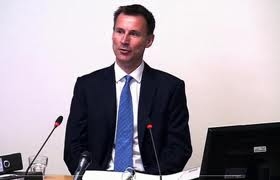The Hunt Legacy
Reshuffle: Jeremy Hunt replaced by Miller at the DCMS
Closing the Film Council, Local TV and the Leveson Inquiry - we examine The Hunt Legacy
Comment, 17 September 2012
 David Cameron has shuffled his government in a bid to boost poll numbers in the run up to the next election.
David Cameron has shuffled his government in a bid to boost poll numbers in the run up to the next election.
The reshuffle, which was announced two weeks ago, saw DCMS minister and homeopathy fan, Jeremy Hunt MP shifted to Health while Disabilities minister Maria Miller MP has been brought in to replace him.
Below we will examine Hunt’s DCMS legacy and explore what Miller might bring to the role.
Jeremy Hunt, 45, was schooled at Charterhouse and gained a first in PPE from Magdelen College, Oxford. After a stint of teaching in Japan and building his own PR company (Profile PR) in London, he is now the owner of Hotcourses and is worth over £4m.
We look back at the three key moments during his tenure at the DCMS.
Bonfire of the Quango’s
 When the coalition government formed in 2010, it began to make cuts to the public sector. One of the first actions was to become known as the ‘Bonfire of the Quangos’, with almost 200 public bodies being scraped, regardless of performance. Jeremy Hunt closed the UK Film Council, invoking considerable ire from an industry already wary of potential cuts.
When the coalition government formed in 2010, it began to make cuts to the public sector. One of the first actions was to become known as the ‘Bonfire of the Quangos’, with almost 200 public bodies being scraped, regardless of performance. Jeremy Hunt closed the UK Film Council, invoking considerable ire from an industry already wary of potential cuts.
The timing of the closure surprised those currently working at the Film Council as they hadn’t been consulted. It prompted, inevitably, the set up of a new facebook group in protest which has gained over 55,000 ‘likes’. A total of 55 leading actors, directors and producers wrote a joint letter to the Daily Telegraph ironically questioning Hunt’s motivation.
What compounded the frustration was that the Hunt, MP for South West Surrey announced the closure without any indication of review or roadmap for the future. It took several weeks of limbo for plans of a review to emerge, by which time Hunt had alienated himself from the industry and Ed Vaizey was pushed forward to lead the review and strategy.
Only on the 16th January this year, 18 months after the closure of the UKFC, Vaizey and Chris Smith MP delivered the manifesto document ‘A Future for British Film’, which was very well received. Hunt was not present at the launch which took place at the Vue Cinema in Leicester Square.

Local TV
After his baptism of fire closing the UKFC, the minister then turned to television for his second major moment in office.
Hunt’s grand plan for television production was to license local TV operations for the UK’s major towns and cities. The Minister’s case observed that Birmingham, Alabama (USA) (population 212,000) had 8 local TV stations while Birmingham, England (UK) (population 1m), had none. Hunt argued there was a case for major UK cities to open up local markets and deliver localised programming.
However, the comparison between local TV in the two Birmingham’s was never really direct. The US model of local TV is typically subsidies of major networks who buy syndicated programming and local government supported Public Broadcast Service.
Hunt had a vision that would open up new channels for advertisers and deliver localised news all over the UK.
Interestingly, many of the applicants for the UK licenses come from newspaper groups such as Trinity Mirror and The Evening Standard. If the ‘dead wood’ media can’t compete with the internet and citizen journalist, they can be exclusive in broadcasting. TV has increased its share of the UK advertising market for the last three years to over 25%. People are watching more TV, with the average viewer watching around 4 hours per day. As well as localised advertising opportunities, there is also scope for cross promotion, something that the porn magnate Richard Desmond has continues to do between his ownership of Channel 5, the Daily Express and OK! Magazine.
It is worth noting that while Local TV may be a good thing for advertisers, the last incarnation of tabloid newspapers on television was L!VE TV. That channel gave us the News Bunny, Topless Darts and Britain’s bounciest weather with the Rusty Goffe. L!VE TV was headed up by the now Daily Mail columnist, Janet Street Porter and the odious Kelvin MacKenzie.
Dial M for Murdoch
The third and most prominent part of Hunt's legacy very nearly saw the Culture Secretary pulled into the News International bonfire.
Hunt's most embarrassing time in office was while he came under scrutiny from the Leveson inquiry. Politically, his position between Rupert Murdoch and David Cameron was seen as a firewall that kept his Prime minister at a (thin) distance from the toxic News International. If he were forced to resign during the scandal, the Prime Minister would then become the target
Hunt had publically supported Murdoch prior to taking over the decision on the BSkyB bid. This, coupled with the PM’s cosy personal and professional relationships with Rebekah Brooks and Andy Coulson, provided plenty of ammunition to those opposing the bid. Hunt had aimed to show transparency by taking a quasi-judicial role in the decision making but was accused by Chris Bryant MP (Lab) of both breaking the ministerial code and misleading parliament.
 News Internationals emissary, Fred Michel, lobbied the DCMS and in particular Jeremy Hunt’s PPS, Adam Smith. Michel sent hundreds of text messages and emails that ultimately cost Smith his job while Hunt has just received a promotion to Health Secretary.
News Internationals emissary, Fred Michel, lobbied the DCMS and in particular Jeremy Hunt’s PPS, Adam Smith. Michel sent hundreds of text messages and emails that ultimately cost Smith his job while Hunt has just received a promotion to Health Secretary.
It’s fair to say that Jeremy Hunt will not be missed by the Film and TV industry, but only time will tell if his local TV initiative will actually work. For now, he replaces the beleaguered Andrew Lansley as the Health Secretary, but the shadow of Lord Justice Leveson still hangs over him. The Government minister who will have to handle the results of the Inquiry, and possibly Hunt’s political career, is Maria Miller, Hunt's replacement at the DCMS.
In the latest reshuffle, former Disabilities Minister Maria Miller has been appointed as the new Secretary for Culture, Media and Sport.
 Maria Miller MP
Maria Miller MP
The Basingstoke MP and LSE educated mother of three became a member of the Conservatives on her 18th Birthday. Her appointment at the DCMS is her first major position in the Tory cabinet.
Miller’s profile in Westminster displays loyalty to the party and she almost never votes against her Prime Minister. According to Theyworkforyou.com, she rarely speaks during debates in the House of Commons and when she does, it is usually addressing education and other issues surrounding children, such as day-care.
Prior to becoming an MP, Miller worked at Grey Advertising and Saatchi as an Account Manager and as a Board Director respectively. Neither would be defined as ‘creative’ roles but she would certainly have had first-hand experience of balancing business and commerce while allowing creativity to flourish - skills and knowledge that her predecessor did not possess.
During her time in the cabinet, Miller closed down many Remploy factories and was responsible for cutting many benefits for people with disabilities. Unsurprisingly, she wasn’t asked to present medals at the Paralympics.
There are several challenges awaiting Miller in her new role; Leveson, local TV, the future of film, the roll out of hi-speed broadband, the Arts Council and the maintenance of the legacy of the Olympic and Paralympic games.
Miller has also been handed the Equalities and Women’s portfolio on top of her DCMS duties. Balancing so many components, may be the most challenging aspect of all.
What are the priority issues that Maria Miller MP should focus on while in office? Members can leave comments below.
thecallsheet.co.uk is the members only network for those working in Film, TV, commercials and promos in the UK. Membership is free and services include a chase list, jobs board, online diary service, interviews, discounts, downloads, forums, glossary and more... with our database of over 7000 productions and with over 1400 members, we make it easy to search for the best crew in the UK.
Comments